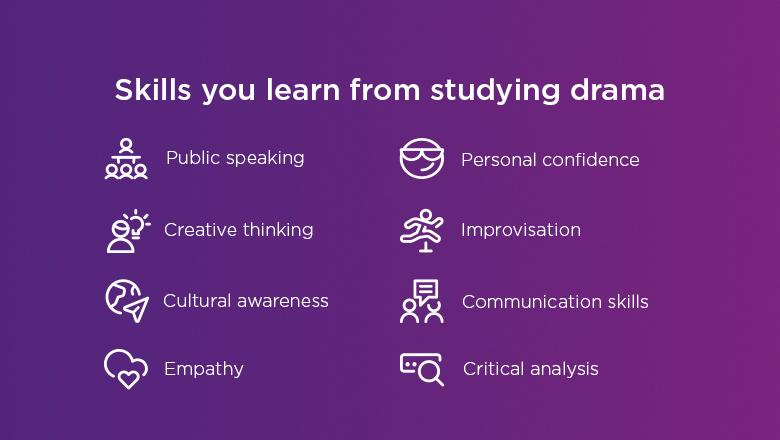Do you dream of performing your heart out on the stage or seeing your creative writing come to life? Well, a drama degree or drama major is obviously for you.
But even if acting or scriptwriting isn’t your calling, you might be surprised by how much studying drama at university can impact your career – and your life.
This major can set you up for a variety of diverse careers, and it’ll give you a skill set that can enhance your performance and confidence in any workplace.
Let’s explore the benefits of studying drama and some of the jobs it can lead to, with insights from UQ Senior Lecturer and Drama Major Convener Dr Bernadette Cochrane.
Is Drama a good major?
Drama is a useful and immersive major for anyone with a general interest in theatre – not just aspiring actors. Whether your ambitions lie in the spotlight, behind the scenes or anywhere along the creative journey from script to production, studying drama at university can give you the foundation to step confidently into the industry after you graduate.
“By studying theatre history, theory and practice at UQ, you’ll be challenged to think about what constitutes performance on the stage, on the page, and in everyday life,” says Bernadette.
“You’ll develop an understanding of the theatrical and literary aspects of drama, from ancient Greek classics and medieval theatre to the most recent plays from around the world.”
The Drama major isn’t all theory, though. While exploring the academic side of theatre, you’ll also be diving right in to create your own pieces.
“You’ll work with leading local, national and international practitioners to develop work in our state-of-the-art studio facility,” says Bernadette.
“As you progress through your major, you’ll also get to write, perform in, and direct plays for assessment.”
Beyond creating your own works, this major also explores the process of appreciating and evaluating theatre.
“You’ll critique professional performances, review plays, compare the classics with contemporary scripts, and craft your career on a broad base of knowledge and experience.”
What are the benefits of studying drama?
In a world increasingly full of algorithms and technology, why do we study drama? Well, for starters, communicating effectively has never been more important. And drama graduates are some of the best communicators out there.
On a deeper level, the study of drama is intrinsically a study of humanity. It explores meaningful questions through abstract thought. It puts human behaviour and history under an artistic microscope. It provokes conversations about why society is the way it is – and it encourages us to make society better.
Understanding theatre allows you to understand the world around you in a different way. And this is something that will stick with you in any profession.

From a more practical point of view, the benefits of studying drama also include acquiring a range of valuable, transferrable skills. These can help you in any job – in or out of the theatre – and include:
- empathy
- public speaking
- creative thinking
- spatial awareness
- personal confidence
- cultural awareness and aptitude
- improvisation (thinking on your feet)
- understanding how you are perceived (and how to adjust this)
- communication skills (both in 1-on-1 conversations and group setting)
- critical analysis and interpretation (e.g. of media messages and artworks).
Drama careers
Many students study drama as their key focus and go on to pursue a career on (or near) the stage. However, many others take the major to enhance their skill set and complement their other major or degree. This means majoring in Drama can lead to jobs dedicated to the theatre and jobs that are somewhat related to theatre, but it can also help you thrive in a profession that has no surface-level connection to drama at all.
“As well as developing your creative practice, enhancing professional opportunities and complementing other academic qualifications, a major in Drama can lead to arts-related careers or vocations,” says Bernadette.
“You can also enhance your career prospects with the UQ Employability Award, for which we provide extracurricular masterclasses in playwriting, directing, dramaturgy and acting.”
Alumni spotlight: Heather Fairbairn
- Stage Director
- Bachelor of Arts (Drama)

Heather is a UQ Drama graduate who is now a stage director, working nationally and internationally in theatre and contemporary opera.
"The UQ Drama program prepared me for a career in the theatre industry by arming me with a comprehensive knowledge of performance-making practices ranging from Ancient Greek theatre through to contemporary theatre,” she says.
“The in-depth study of theatre history, complemented by the practical experience gained as Assistant Director and Dramaturg on production courses, provided me with a strong foundation from which to pursue a Master of Fine Arts (Directing) at NIDA and, ultimately, a career as a freelance theatre director."
Drama major jobs
“With a Bachelor of Arts majoring in Drama, there are numerous professions possible,” says Bernadette.
Some of the common careers our Drama graduates pursue include:
- playwright
- director
- performing arts coordinator
- theatre manager
- stage manager
- drama teacher
- acting coach
- speech and drama tutor
- arts administrator
- government arts policy adviser
- arts publicity manager
- dramaturg
- theatre critic / journalist
- youth and community arts worker.
Studying drama at university as an undergraduate can also be your first step towards academia.
“Many of our students go onto postgraduate study both here at UQ and abroad,” says Bernadette.
Study drama at UQ
When you choose the Drama major as part of your UQ Bachelor of Arts, you’ll get to choose from courses such as:
- Elements of Performance
- The Theatre Experience
- Performative Communication: Presentation and Public Speaking
- Playwriting and Dramaturgy: Creative Practice
- Live Theatre Production: Performance Creation and Event Management
- Theatre Historiography: Making the Connections
- Major Movements in European Theatre
- Experimentation in 20th Century Theatre
- Australian Drama
- Contemporary Theatre and Performance
You may also choose to complete a secondment, field trip or research project in your final year.
Learn more about UQ's Drama major Explore other options in the UQ Bachelor of Arts






